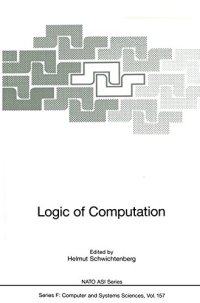
Ebook: Logic of Computation
- Tags: Logics and Meanings of Programs, Software Engineering, Mathematical Logic and Formal Languages, Programming Languages Compilers Interpreters
- Series: NATO ASI Series 157 Series F Computer and systems sciences
- Year: 1997
- Publisher: Springer-Verlag Berlin Heidelberg
- City: Berlin, Heidelberg
- Edition: 1
- Language: English
- djvu
The Marktoberdorf Summer School 1995 'Logic of Computation' was the 16th in a series of Advanced Study Institutes under the sponsorship of the NATO Scientific Affairs Division held in Marktoberdorf. Its scientific goal was to survey recent progress on the impact of logical methods in software development. The courses dealt with many different aspects of this interplay, where major progress has been made. Of particular importance were the following. • The proofs-as-programs paradigm, which makes it possible to extract verified programs directly from proofs. Here a higher order logic or type theoretic setup of the underlying language has developed into a standard. • Extensions of logic programming, e.g. by allowing more general formulas and/or higher order languages. • Proof theoretic methods, which provide tools to deal with questions of feasibility of computations and also to develop a general mathematical understanding of complexity questions. • Rewrite systems and unification, again in a higher order context. Closely related is the now well-established Grabner basis theory, which recently has found interesting applications. • Category theoretic and more generally algebraic methods and techniques to analyze the semantics of programming languages. All these issues were covered by a team of leading researchers. Their courses were grouped under the following headings.
The Marktoberdorf Summer School 1995 'Logic of Computation' was the 16th in a series of Advanced Study Institutes under the sponsorship of the NATO Scientific Affairs Division held in Marktoberdorf. Its scientific goal was to survey recent progress on the impact of logical methods in software development. The courses dealt with many different aspects of this interplay, where major progress has been made. Of particular importance were the following. • The proofs-as-programs paradigm, which makes it possible to extract verified programs directly from proofs. Here a higher order logic or type theoretic setup of the underlying language has developed into a standard. • Extensions of logic programming, e.g. by allowing more general formulas and/or higher order languages. • Proof theoretic methods, which provide tools to deal with questions of feasibility of computations and also to develop a general mathematical understanding of complexity questions. • Rewrite systems and unification, again in a higher order context. Closely related is the now well-established Grabner basis theory, which recently has found interesting applications. • Category theoretic and more generally algebraic methods and techniques to analyze the semantics of programming languages. All these issues were covered by a team of leading researchers. Their courses were grouped under the following headings